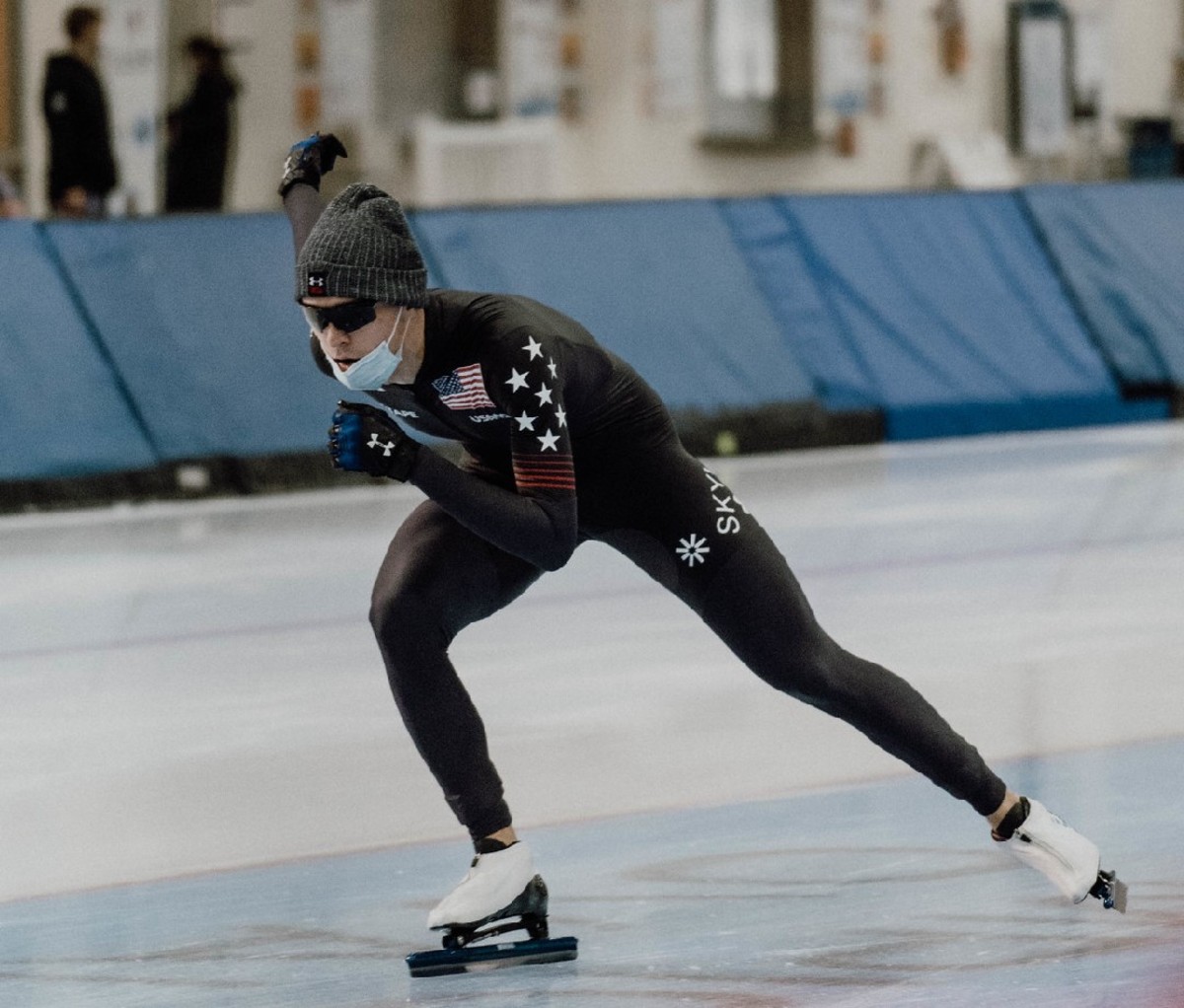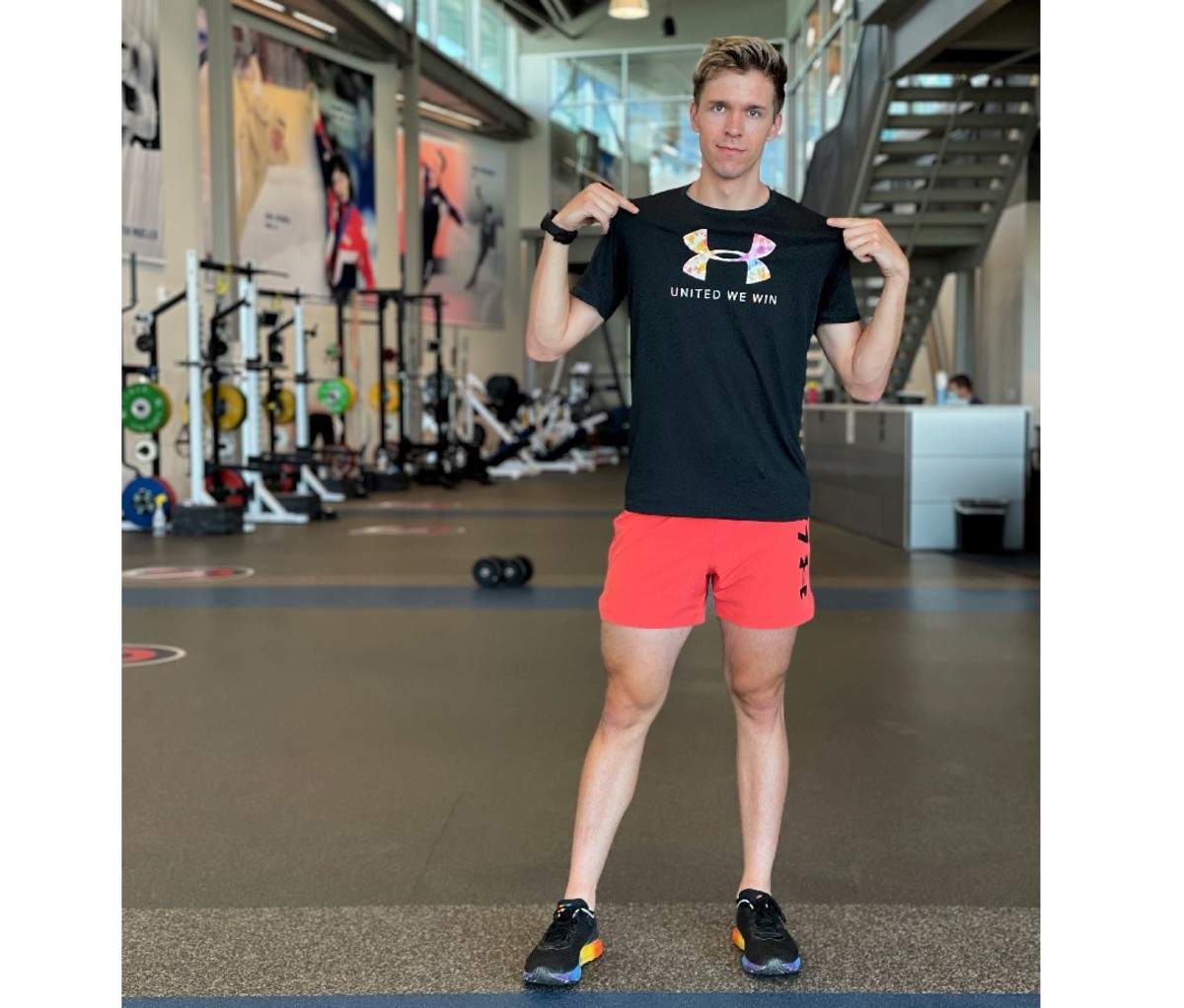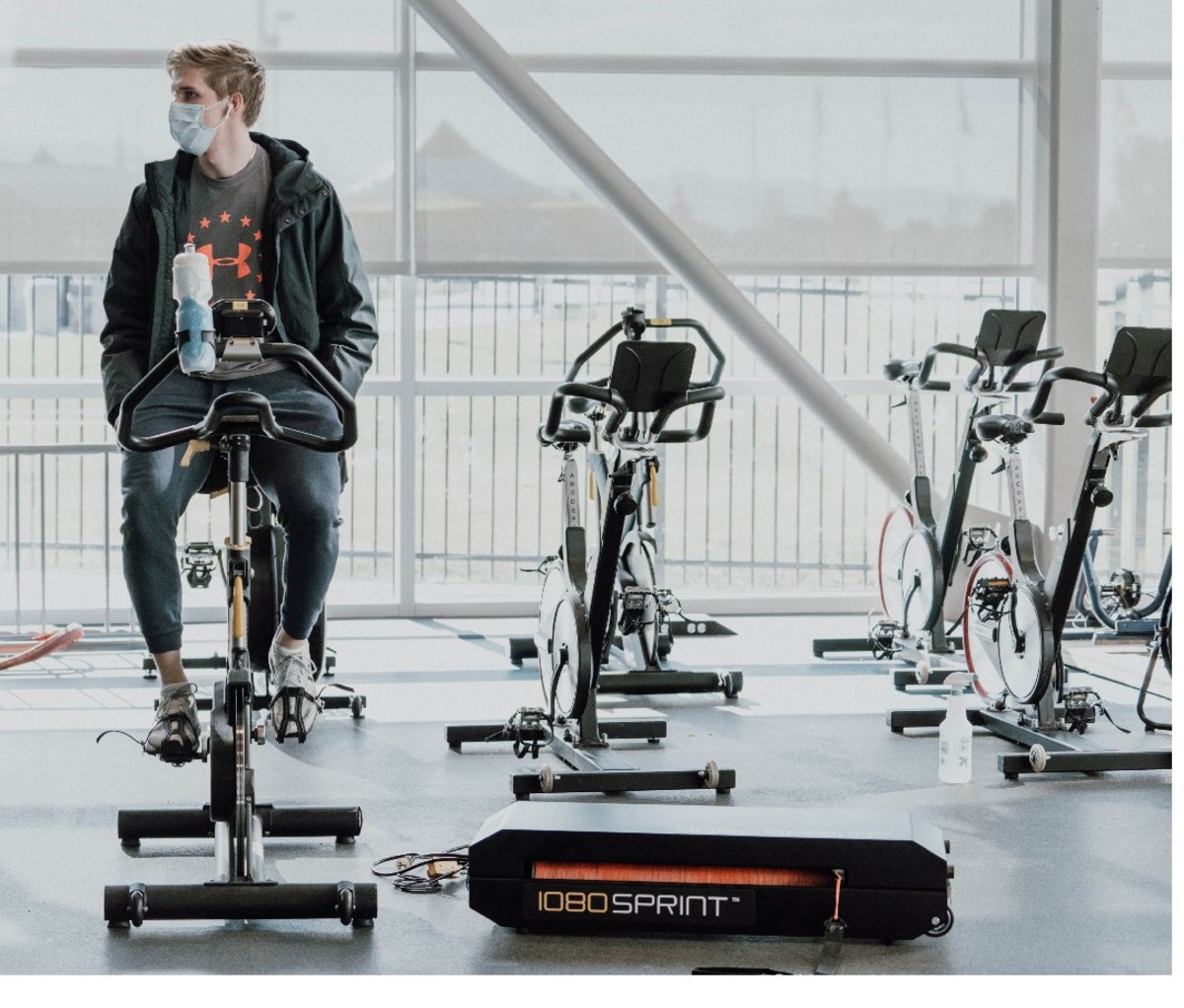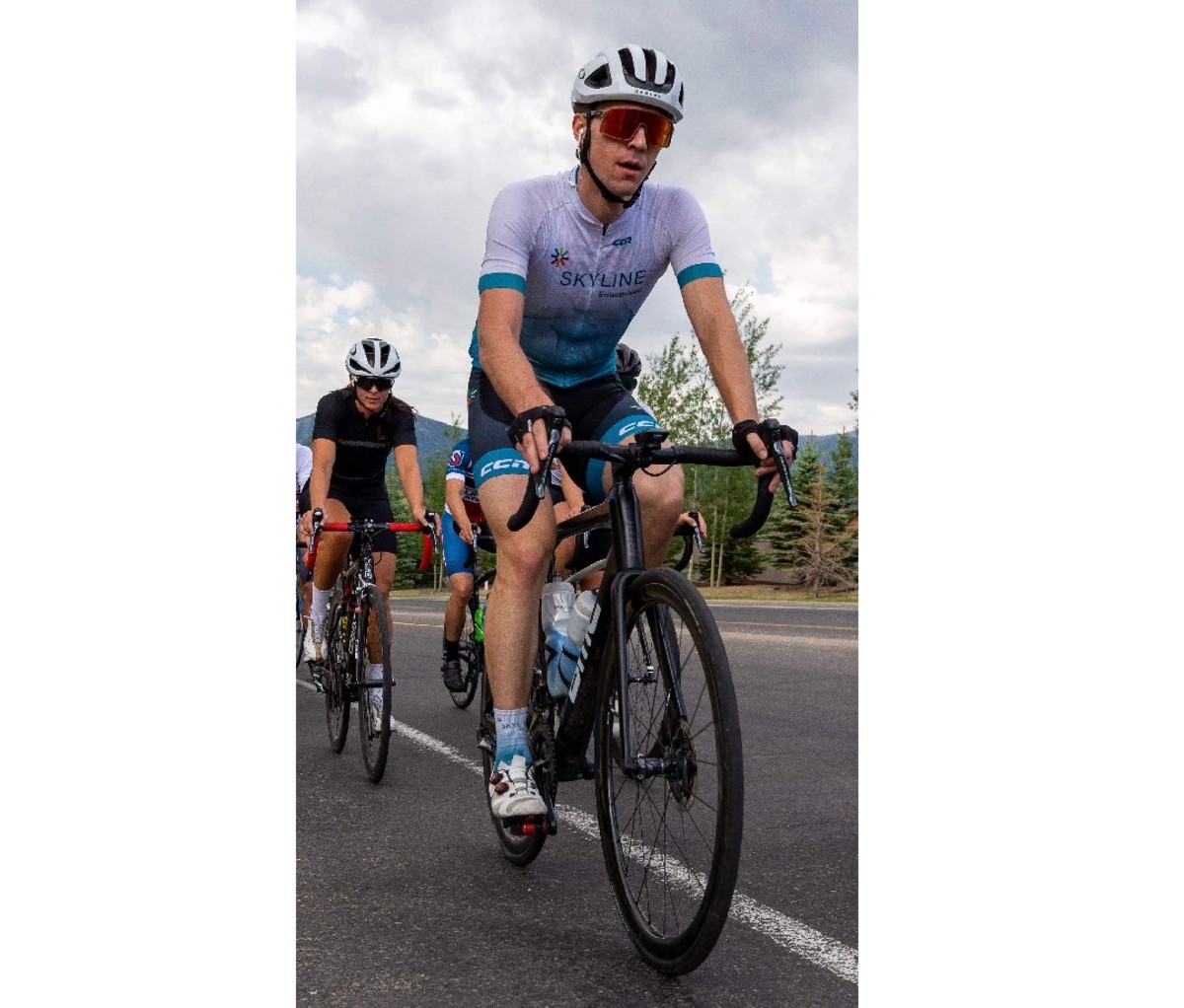Team USA Speed Skater Conor McDermott-Mostowy on Embracing Failure

Success. What does that word mean when you’re an elite 21-year-old athlete and neuroscience major? Long-track Team USA speed skater Conor McDermott-Mostowy has a few thoughts about personal goals, becoming a well-balanced man, and what it means to represent the United States in the 2022 Olympics. He also has his own definition of success—and it’s not what you’d think.
For those of us who remember Eric and Beth Heiden, they truly introduced the U.S. to the sport. The Wisconsin-born siblings excelled in speed skating, cross-country skiing, tennis, soccer, and cycling back in the day when athletes didn’t specialize in one sport from a young age. Beth was a speed skating bronze medalist at the 1980 Lake Placid Winter Olympics and Eric won five speed skating gold medals. Their Upper Midwest, All-American smiles were on Wheaties boxes, the cover of TIME, and in our living rooms.
Short-track speed skating only made its Olympic debut at the 1992 Winter Olympic Games. In South Korea, China, the Netherlands, and Norway, skating is extremely popular, but speed skating in the U.S. remains less so. In 2002, Nathaniel Mills, the three-time Olympian in long-track speed skating, helped start a beginner speed skating program at Fort Dupont Ice Arena in Washington, D.C.—a mecca for small skating clubs producing world-class speed skaters. Why The Beltway and not Salt Lake, Park City or Duluth? Coaching is the key. Years ago, Korean parents in the area started recruiting coaches directly from South Korea’s talent pool, organizing their visas and paying their salaries. That pipeline of talent has flowed and flourished. Now, three extremely competitive skating clubs stand out: Dominion, Potomac Speed skating and United Capital Blades.
McDermott-Mostowy discussed the rise of speed skating in the United States and why this sport gripped him so young.
 Courtesy ImageMen’s Journal: How is training going?
Courtesy ImageMen’s Journal: How is training going?
Conor McDermott-Mostowy: I’ve taken a year off from college and that has allowed me to train full time. I’ll be going into my junior year after The Games.

 Courtesy ImageWhich events are you going for gold in Beijing?
Courtesy ImageWhich events are you going for gold in Beijing?
I’m eyeing the 1000m, 1500m, Mass Start, and Team Pursuit events.
What skaters or athletes did you look up to when you were a kid—and who was your biggest influence as an athlete, coach, and/or mentor?
I definitely looked up to Shani Davis from a young age, and as I got older I came to have great respect for Heather Richardson Bergsma and Brittney Bowe because of their poise and humility despite both being powerhouses in skating. I’m so grateful to have the opportunity to train with Brittney now and call her my friend as well as teammate. I’m also extremely excited to watch Gus Kenworthy ski.
When I was transitioning from short-track to long-track, one of the best experiences I had as a kid was watching Shani Davis. He made short-track in 2002 and by 2006 he was skating long-track—winning silver and gold in 2006 and 2010. I met him once and he was just so incredible. Meeting him was an awesome, indelible experience for me. He’s a great example of focus, technical execution, and kindness off the ice.
A word about your coaches? For non-athletes, it can be difficult to understand the athlete-coach relationship at the highest levels of sport.
My first coach was Nathaniel Mills—a 3-time Olympian [‘92, ‘94, ‘98] for Team USA in long-track. My first coach in Utah was Mitchell Whitmore, who’s also a 3-time Olympian (‘10, ‘14, ‘18) for Team USA in long-track. My current coach is Ryan Shimabukuro, our long-track National Team USA Sprint Coach.
I worked with my short-track coach [Hyun Jung Lee, a standout Korean Olympian in 1988] for eight years and we had conversations about how our training together fundamentally changed the way she coaches. She grew up among the Washington, D.C., community of speed skaters that implemented a very strict method of training. At the end of our tenure together, Coach Hyun Jung Lee, said to me, “You are as strong as I can make you. There’s nothing more I can teach you.” It was time for me to transition away. We both knew it was time.
 Courtesy ImageUnlike some athletes, you weren’t a prodigy or a standout from the beginning. Can that pay dividends in the long run?
Courtesy ImageUnlike some athletes, you weren’t a prodigy or a standout from the beginning. Can that pay dividends in the long run?
Yeah, thankfully my parents prevented me from burning out early. There’s a deep tradition of speed skating in D.C. because of the Korean community. They’re the technical gold standard of the sport. Coach Lee told me that when she was younger, skating was the singular focus and everything else was sacrificed. She expressed that she was interested in making me a less singularly focused athlete and more of a well-rounded person—taking what she herself had learned and imparting that cautionary wisdom on me. I have my parents to thank for my long-haul focus psychology. They don’t let me get singularly obsessed, and I’m grateful for that too. I’ve definitely had a lot more failure than I’ve had success in my life. I wasn’t a prodigy, so I accepted failure and moved on.
 Courtesy ImageWhat’s the biggest lesson you’ve learned from failure and success as an athlete?
Courtesy ImageWhat’s the biggest lesson you’ve learned from failure and success as an athlete?
A poor result is only a failure if you don’t learn from it. I lost a lot when I was younger, and I think all that losing contributed to my success now. I never got comfortable with where I was and learned from every race I lost.
Are you a perfectionist?
Yeah, I am. I’m very technically-focused. The best skaters are flawless in every move they make. Part of what I love about skating at this level is that you can’t hide behind anything.
We have a saying in skating: Practice doesn’t make perfect. Perfect practice makes perfect. I show up 100 percent every day to skate. When I made the first World Team two years ago, it was the most excited I’ve ever felt about skating. My coach instilled so much confidence in me, so going from short-track to long-track was a thrill.
 Courtesy ImageWhat the greatest benefits and challenges of being an elite athlete?
Courtesy ImageWhat the greatest benefits and challenges of being an elite athlete?
Being a professional athlete can be the best and worst job ever. It’s an incredible opportunity waking up every day and going into work to do what I love. I get to travel the world. I have access to amazing support staff that monitor my nutrition, give me massages, and just keep me in the best shape I can be both physically and mentally.
Where the fantastical illusion of being a professional athlete starts to crumble is when you look at the financial side of the sport and the lack of “job security.” Speed skating is not like basketball or football where professional athletes are all paid handsomely. The stories of Olympic athletes like Michael Phelps or Simone Biles who cash in from their athletic success are the exception, not the rule. How much I get paid, and even if I have access to healthcare, is dependent upon my results each year. I’m fortunate enough to have an amazing sponsor that helps pay for what I do and makes it all possible—but if I didn’t, I wouldn’t make half of what I need to survive.
In most of the countries we compete with, Olympic programs are government-funded. Their athletes are at least paid enough to live. That’s not the case with Team USA. I don’t think most people understand how prohibitively expensive training to be an Olympian is.
 Courtesy ImageHow are you preparing mentally and physically?
Courtesy ImageHow are you preparing mentally and physically?
The average training day consists of two workouts with a break in the middle for lunch. We usually skate in the morning, then have off-ice training, weights, or a bike ride in the afternoon. Recovery is almost as important as training. You need to be rested and recovered in order to perform your best every day. As a national team athlete, I have access to athletic trainers to treat acute injuries and perform recovery massages. I also have access to myriad recovery tools from hot/cold baths to compression sleeves for my legs that use pressurized air pockets to increase circulation and flush lactic acid.
How does diet factor in?
I don’t believe that you have to have a strict diet as an athlete as long as you’re conscious of what you’re putting in your body. At U.S. Speed Skating we have a great nutritionist who helps us navigate what we eat, and she agrees there isn’t a singular diet that fits all athletes. Simply cutting out all sugars and fats isn’t healthy or necessary, but I do try to just be mindful of what I eat.
In all athletics, there’s a huge mental game happening alongside the physical one. How do you view the mind/body connection?
I’ve spent a lot of time in the last few years thinking about that. If you’ve ever been through a rough breakup or had a loved one die, you know how powerful the mind is and how it can affect your physical wellbeing. The ability to overcome the messages your brain is sending is key to becoming a better athlete. I’m someone who used to not eat or not eat enough on race day because my nerves would make me so nauseous. It took a lot of work and experimentation to be able to overcome that urge not to eat, but being able to properly fuel your body, even when you don’t want to, is a skill all athletes must learn.
 Courtesy ImageHow would you describe your mindset right now?
Courtesy ImageHow would you describe your mindset right now?
I get a little solitary before competition these days. When I was younger, and not as mentally strong, I’d become withdrawn, serious, and sort of scary. Honestly, I try not to think of goals like winning a medal. Instead, I focus on technical aspects of the sport.
What message would you send to young men out there who have a goal and dream—athletic or not?
I think the saying, “If you dream it, you can achieve it” is completely true. Achieving a dream is not as easy as that saying makes it seem, but I believe the spirit of the saying to be fundamentally true. Most lofty goals can be achieved if you are willing to put in the time and effort. Malcolm Gladwell popularized the idea that to become an expert in something, you have to put at least 10,000 hours into it. While I don’t subscribe to any philosophy that sets hard rules, I’d agree with his assertion that natural talent really only separates people who have put in the same amount of time in the pursuit of a goal. If you’re willing to put in more time and effort than someone who appears to be more naturally gifted than you, you can surpass them.
Your take on the “Just shut up and dribble” era of asking athletes to remain apolitical in the public domain?
I find that extremely offensive, objectifying, and insulting. Who we are outside of the ring matters. Being vocal is not for everybody, but it’s something I feel strongly about. I use my platform and voice to support positive change.
How do you define success?
I was walking by some graffiti a while back that had the word “success” painted on the wall. Success is always a moving target. For me, I always first ask: Does my success come at a cost to others? It’s a great motto to live by so I had the word tattooed on my arm. My mother and grandmother were floored.
The tattoo is a reminder for me. It means that I know I’m here. It reminds me to be satisfied. If I don’t medal, I can do plenty of things after that. I need to take inventory often and be happy just working toward this goal. It’s an ongoing process. Plus I have other ambitions so speed skating will not be the zenith of my life. I plan to go for more Olympics in 2026, then move on to other life goals. I’ll walk away with my head up no matter what. That’s the thing about success: It’s not about the crowds, the competition, or the outcome. I know it’s there.





